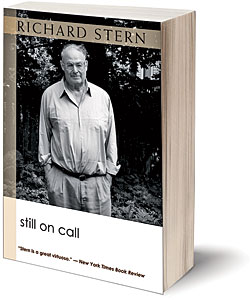
The award-winning author Richard Stern insists that the time has come to stop, to pack it in, to cease shaping words and ideas and characters—real and imagined. This spring, the University of Michigan Press will publish Stern’s 23rd book, Still on Call ($25.95), a collection of essays, recollections, observations, and blogs that Stern refers to as an “orderly miscellany.” His publisher describes the work as Stern’s final collection.
Now 82, Stern grew up in New York City and was a professor of English and the humanities at the University of Chicago from 1955 until his retirement in 2002. In the preface to Still on Call, he offers this self-assessment: “In some ways, I’m a wiser, more knowledgeable and even abler writer than I was ten, twenty or fifty years ago.” That edge and muscle are on display in the work that follows.
The first section, “Coasting,” includes essays that Stern wrote based on talks he gave at universities and on entries from the journals that he has kept for almost 60 years. In one essay, he recalls the generous response he received from his teacher and fellow students when he read a story aloud in a sophomore English class. “A key turned in the lock of a door I hadn’t even noticed,” Stern writes. And he was on his way as a young man of letters.
“Posting,” the second section, comprises blogs that Stern wrote for The New Republic from 2006 to 2009. Often he starts with a news story or an essay he has read and takes off on an adventurous riff. “I like to compare what’s happening on Tuesday, June 18th, with what I’ve been reading or what I remember from the past,” Stern says. So it makes sense, then, that the news of Lewis “Scooter” Libby’s conviction leads to a recollection of a story by Jorge Luis Borges. Stern’s last blog is a moving appraisal of the late John Updike.
In “Hosting,” Stern recalls brief encounters with literary greats such as André Malraux and Sinclair Lewis and decades-long friendships with, among others, Saul Bellow and Philip Roth. Then, in the final chapter, Stern shuts the door that was opened for him long ago: “I believe that I’ve never needed to write; I’m not a driven writer. I wrote because I wanted to. Even when the work was difficult, even agonizing, whatever was necessary to keep going was there for me. Now it wasn’t.”
Stern lives in Hyde Park with his wife, Alane Rollings, now 59 and the author of five books of poetry, in a 19th-century house filled with a singular collection of art, objects, and Oriental rugs. They have been together for 41 years. “We have a simple little life here,” Rollings says. “I’m completely content, and I think Dick is pretty content. We don’t do anything. We watch TV.”
“She adores Survivor; I can’t stand it,” Stern says.
If he could start a new career, he thinks that he might consider making documentaries. Our expectation is that, protests aside, both Stern and Rollings will emerge full force in print again soon.


